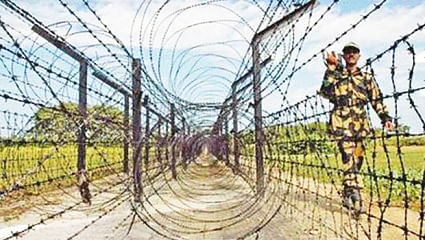Indo-Bangla border: BJP sounds war bugle
Indo-Bangla border: BJP sounds war bugle

It was a hot March afternoon at Nyajat village in North 24 Parganas district of West Bengal, India. A crowd of about 150 people – mostly women – gathered at a meeting addressed by BJP candidate Samik Bhattacharya before the 2014 general elections.
“This is a not an ordinary election. It’s a struggle to determine whether areas like Hingalganj, Minakha and Basirhat on the Indo-Bangladesh border will remain in India.” Bhattacharya’s statement sounded too dramatic – or unbelievably alarmist – but the crowd found it only logical, reports Hindustan Times.
He told his women audience: “Ask yourself whether you can protect your family in this regime. You may be attacked anytime, and the attackers are coming from the other side (of the border). Keep your kitchen knives ready.” The crowd responded with a resounding ‘Jai Sri Ram’.
One has to visit these border areas to assess the extent of activities of Muslim fundamentalist organisations — mainly of the Bangladeshi variety — and the Trinamool Congress government’s absolute non-action on this front.
State police intelligence sources said a chain of private madarsas has come up along the entire 2,216.7-km-long border with vast porous stretches that West Bengal shares with Bangladesh.
The sources said since the state government’s political will is almost non-existent, the private madrasas are freely sheltering Bangladeshi fundamentalists for whom things became too hot after the Sheikh Hasina-led Awami League government took over in December 2008.
But all that Sultan Ahmed, MP and the party’s core committee member, is ready to say is: “The BJP is trying to spread venom in Bengal. They should know Bengal is a tough place. Our party is ready to counter all these evil forces.”
The result: An unprecedented rise in the popularity of the RSS leading to an eyeball-to-eyeball situation between the trained and well armed foreign militants and the RSS in the border areas.
The battleground: North Dinajpur, Murshidabad, Malda and North and South 24-Parganas districts and the Alipurduar subdivision of Jalpaiguri district.
Subhas Mondal, general secretary of the BJP unit in Murshidabad — the worst affected district so far — said, “Infiltration by the Jamaat and the Rajakar — pro-Pakistani armed groups active during the 1971 war — is a big problem for us. It has increased recently.”
Police investigations also reveal that private madrasas in Murshidabad — especially in Lalgola, Ranitala and Jalangi areas — are being controlled by the Pakistan-based Jamiat Ahle Hadees, which has a solid base in Bangladesh and is considered to be the spiritual guide of the banned SIMI.
A state police official told HT on condition of anonymity that in recent times a good number of unknown persons had been spotted in villages in Murshidabad’s Jalangi, Raninagar, Domkal, Shamserganj and Lalgola.
Masquerading as seminary students, these combat-trained activists are easily recognisable as they are men of mid to late thirties with their trademark skull caps, short salwars, long kurtas and plastic sandals. And their Bangladeshi dialect is too foreign to the locals.
“But we haven’t been able to trace these people though we have information that they are being sheltered by specific groups,” the state police official admitted.
He said on average, there are four-to-five government recognised or private madrasas in each of the 254 panchayats in Murshidabad.
Most of them have come under the control of the Bangladeshi extremist outfits.
And the scene is not much different in the other border districts of Bengal.